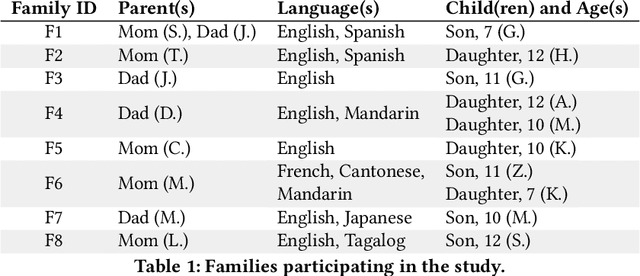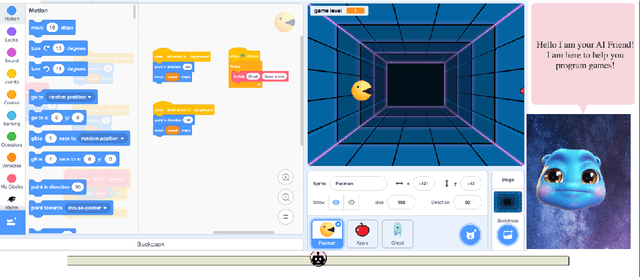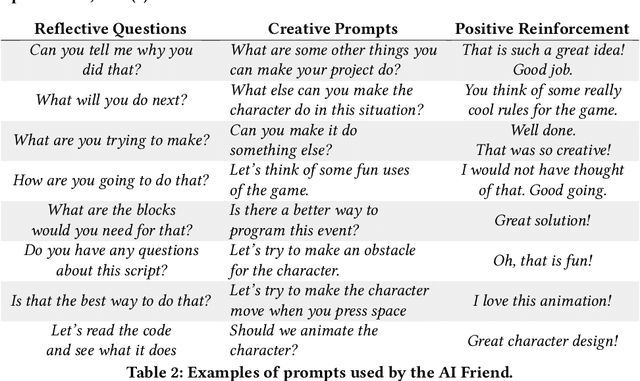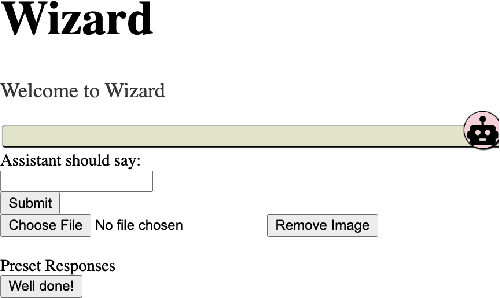Stefania Druga
Scratch Copilot: Supporting Youth Creative Coding with AI
May 06, 2025Abstract:Creative coding platforms like Scratch have democratized programming for children, yet translating imaginative ideas into functional code remains a significant hurdle for many young learners. While AI copilots assist adult programmers, few tools target children in block-based environments. Building on prior research \cite{druga_how_2021,druga2023ai, druga2023scratch}, we present Cognimates Scratch Copilot: an AI-powered assistant integrated into a Scratch-like environment, providing real-time support for ideation, code generation, debugging, and asset creation. This paper details the system architecture and findings from an exploratory qualitative evaluation with 18 international children (ages 7--12). Our analysis reveals how the AI Copilot supported key creative coding processes, particularly aiding ideation and debugging. Crucially, it also highlights how children actively negotiated the use of AI, demonstrating strong agency by adapting or rejecting suggestions to maintain creative control. Interactions surfaced design tensions between providing helpful scaffolding and fostering independent problem-solving, as well as learning opportunities arising from navigating AI limitations and errors. Findings indicate Cognimates Scratch Copilot's potential to enhance creative self-efficacy and engagement. Based on these insights, we propose initial design guidelines for AI coding assistants that prioritize youth agency and critical interaction alongside supportive scaffolding.
AI Friends: A Design Framework for AI-Powered Creative Programming for Youth
May 17, 2023



Abstract:What role can AI play in supporting and constraining creative coding by families? To investigate these questions, we built a Wizard of Oz platform to help families engage in creative coding in partnership with a researcher-operated AI Friend. We designed a 3 week series of programming activities with ten children, 7 to 12 years old, and nine parents. Using a creative self efficacy lens, we observe that families found it easier to generate game ideas when prompted with questions by AI Friend; parents played a unique role in guiding children in more complex programming tasks when the AI Friend failed to help, and children were more encouraged to write code for novel ideas using the AI friend help. These findings suggest that AI supported platforms should highlight unique family AI interactions focused on children's agency and creative self-efficacy.
Scratch Copilot Evaluation: Assessing AI-Assisted Creative Coding for Families
May 17, 2023



Abstract:How can AI enhance creative coding experiences for families? This study explores the potential of large language models (LLMs) in helping families with creative coding using Scratch. Based on our previous user study involving a prototype AI assistant, we devised three evaluation scenarios to determine if LLMs could help families comprehend game code, debug programs, and generate new ideas for future projects. We utilized 22 Scratch projects for each scenario and generated responses from LLMs with and without practice tasks, resulting in 120 creative coding support scenario datasets. In addition, the authors independently evaluated their precision, pedagogical value, and age-appropriate language. Our findings show that LLMs achieved an overall success rate of more than 80\% on the different tasks and evaluation criteria. This research offers valuable information on using LLMs for creative family coding and presents design guidelines for future AI-supported coding applications. Our evaluation framework, together with our labeled evaluation data, is publicly available.
 Add to Chrome
Add to Chrome Add to Firefox
Add to Firefox Add to Edge
Add to Edge